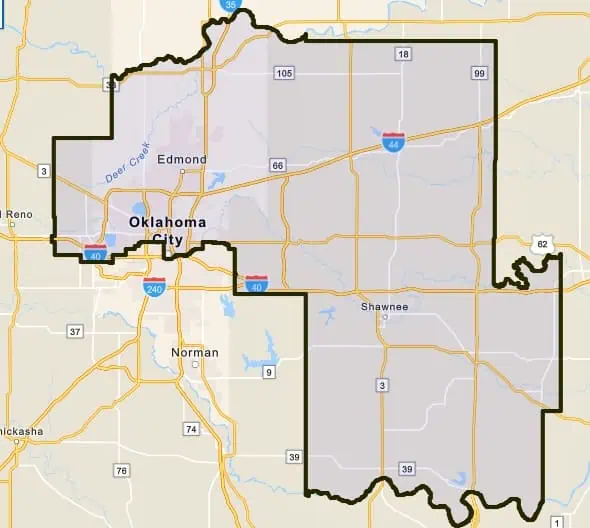OKLAHOMA CITY (Free Press) — With the general election just weeks away, Oklahoma County voters will soon cast their ballots for candidates on November 5 to decide their representatives at all levels, from local offices to the nation’s capital.
Democrat Madison Horn and Republican incumbent Stephanie Bice are competing for the 5th Congressional District seat, which covers most of Oklahoma County, all of Lincoln, Pottawatomie, and Seminole counties, and parts of Canadian and Logan counties.
In the 2021 redistricting process, the Republican supermajority in the Oklahoma Legislature significantly altered the competitive and increasingly “purple” CD-5 by removing a large portion of the heavily Hispanic Southside Oklahoma City. They added more rural and strongly conservative regions into the northern part of the district where Bice had campaigned through several Oklahoma Senate wins.

While they share a last name, Madison Horn is unrelated to Kendra Horn, the former Congresswoman of Congressional District 5. The district had been traditionally Republican-led since 1975 until Kendra Horn defeated Republican incumbent Steve Russell in 2018, marking the first time a Democrat won the seat in 44 years.
According to the state’s January data reports, registered Republicans account for 48.9% of all voters in the district, 29.9% are Democrats, and 20.1% are Independents.
Stephanie Bice
Bice is currently serving her second term. She was first elected in 2020 when she defeated her Democratic opponent, Kendra Horn, flipping the seat back to the Republican Party. In 2022, she secured re-election with 59% of the vote, defeating her Democratic challenger, Joshua Harris-Till. Before being elected to Congress, she represented Oklahoma’s 22nd district in the State Senate from 2014 to 2020.
Bice did not respond to interview requests in time for publication.
She chairs the House Administration Subcommittee on Modernization, a bipartisan committee that is tasked with developing recommendations to make Congress more effective and transparent.

Bice has a strong track record of supporting policies that reflect her party’s conservative values. She has consistently voted to protect Second Amendment rights, pro-life policies, stronger border security, and initiatives to support seniors, veterans, and military service workers.
Her voting record aligns with her policy positions on various issues, such as increasing national defense spending, supporting Israel in the Israeli-Palestinian conflict, and championing domestic energy production.
During her tenure, Bice has voted against legislation that would expand voting access and against requiring states to establish independent redistricting commissions to conduct congressional redistricting.
She opposed the Law Enforcement De-Escalation Training Act of 2022, which ultimately passed Congress and requires the DOJ to develop and fund de-escalation training for police officers.
In 2021, she was one of 35 Republicans who joined all Democrats in voting to approve legislation to establish a Jan. 6 commission to investigate the storming of the U.S. Capitol.
Madison Horn
Horn, cybersecurity expert, and Cherokee Nation tribal citizen, is running to unseat Bice in the upcoming November general election. In 2022, she ran against longtime Republican US Senator James Lankford’s seat but ultimately lost.
In an interview with the Free Press, Horn discussed her upbringing in rural Oklahoma and her extensive expertise in cybersecurity. Horn emphasized the critical need for cybersecurity knowledge in Congress, pointing out significant gaps in the current leadership’s understanding.
“My desire to run for office was seeing a huge, huge gap in qualified leadership that understands the needs of everyday people and that can lead without ego and influence of the party,” Horn said. “So, for me, it was a call to action and a huge driver of why I’m continuing this journey to run for CD-5.”

Horn outlined some risks associated with a lack of cybersecurity knowledge, including workforce shortages and weaknesses in critical infrastructure. According to Horn, with this expertise, the U.S. can stay caught up in workforce development for emerging industries such as robotics, AI, and data science, which could lead to economic vulnerabilities.
She also expressed her views on other key issues, including the need to expand mental health resources and support, as well as addressing the root causes of societal issues like gun violence.
In the interview, Horn criticized party politics, stating that both major parties are dominated by special interest groups and a few influential individuals, eroding everyday people’s influence.
“I’ve been a Republican much longer than I’ve been a Democrat… I think party politics is the rot in American politics, and what I mean by that is there is a complete lack of power with everyday people because our political system has turned into special interest, lots of money, and four or five people who are orchestrating things within the Republican and Democratic Party,” Horn said.
“That is not the way our democracy is supposed to be set up,” Horn continued. “No one wants to be courageous and take a stand on something to actually get anything accomplished.”
Her other priorities include fostering economic growth, strengthening border defenses, reforming the criminal justice system, and advocating for clean energy production.
Oklahoma is one of just seven states that allow straight-ticket voting, which enables voters to select all candidates from a single party for each race by marking a single box on their ballot.
The results of this race determine whether all five congressional seats representing Oklahoma remain Republican-held. Republicans hold a 220 to 212 majority over Democrats in the U.S. House.
Early voting will be held from Oct. 30 to Nov. 1, from 8 AM to 6 PM, and on November 2, from 8 AM to 2 PM.
Polls will be open from 7 AM to 7 PM on Election Day. Voters can access the OK voter portal to find a designated polling place and sample ballot.
Brianna Garcia is a freelance journalist covering local politics and culture for Free Press. She has a degree in Journalism from the University of Central Oklahoma.











